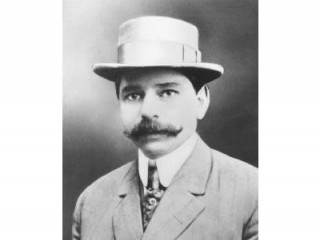
Marcus Loew biography
Date of birth : 1870-05-07
Date of death : 1927-09-05
Birthplace : Manhattan, New York City, U.S.
Nationality : American
Category : Famous Figures
Last modified : 2011-11-05
Credited as : motion picture pioneer, Metro-Goldwyn-Mayer, Metro-Goldwyn Pictures
One of the pioneers in the motion picture industry, Marcus Loew fashioned one of the nation's largest theater chains and then went on to found the young industry's premier studio, Metro-Goldwyn-Mayer.
The American motion picture industry was created by an intriguing group of East European Jewish immigrants and children of immigrants—Adolph Zukor, William Fox, Carl Laemmle, Louis B. Mayer, Samuel Goldwyn, Jesse Lasky, and the Warner brothers. Marcus Loew, born on Manhattan's East Side in 1870, was one of these. His father was a waiter and there were four other children, so at the age of six Marcus left school to work as a newspaper boy.
Other jobs followed, mostly in sales, and for a while young Marcus worked as a furrier. But he always had an ambition to own property, to become a landlord, while at the same time he was fascinated by the theater. In 1904, at the age of 34, Loew combined his ambitions and interests by renting a storefront where he opened a nickelodean, the forerunner of today's motion picture theater.
The industry was new, and the public was intrigued by the new means of entertainment. Encouraged by his success, Loew opened additional nickelodeans, most of them in old buildings where rents were low. He then tried to upgrade his operations, seeking middle class locations and offering vaudeville, which was live entertainment, to go along with the films.
Attempting to control costs, in 1910 Loew and his associates organized Loew's Theatrical Enterprises, into which went the nickelodeans and a new venture, People's Vaudeville. He then expanded out of New York, and within two years Loew's Theatrical was one of the largest chains in the nation.
In those days exhibitors like Loew obtained films from booking offices, which in turn purchased them from studios. From the beginning some of the distributors thought in terms of producing their own films to show in their theaters, in this way saving costs and operating more efficiently. Adolph Zukor had organized Famous Players, which was united with a chain of theaters, and others were following his lead. Loew watched this with interest, and in 1919 he formed Loew's Inc., which included his theaters, vaudeville operations, and booking offices. Then he sought to create a film studio.
Loew became interested in Metro Pictures Corporation, which was directed by a Pittsburgh exhibitor, Richard Rowland, and whose secretary was Louis B. Mayer, who owned a string of theaters and soon became involved with production as well. Due to disagreements Mayer left, and Metro soon declined badly, to the point where Rowland was willing to sell it to Loew, which he did.
What Loew had in mind was both clear and simple. Metro would produce films which would be distributed by Loew to his more than 100 theaters. There was only one problem with this plan: Loew didn't know anything about production and had little interest in learning that part of the business. And with the departure of Mayer there was no one left who had the requisite skills.
Casting about for help, Loew came upon Goldwyn Pictures, which had been organized by Sam Goldfish and the Selwyn brothers (Goldfish later changed his own name to that of the studio). Goldwyn had a large studio in Culver City, California, a good reputation, and even some theaters—including New York's Capitol, a quality house which Loew admired. Frank Godsol, who owned Goldwyn, wanted to sell and leave the business.
Having been disappointed with Metro, Loew investigated Goldwyn carefully and learned that it too lacked a strong production team. Refusing to purchase the firm until he could find a leader, Loew approached Mayer, who in the meanwhile had become an important independent producer. Mayer was interested in coming into the combination with the understanding he would be granted a free hand in production, a condition which Loew was more than willing to accept. So it was that in 1924 Goldwyn was purchased by Loew and then merged into Metro to form Metro-Goldwyn Pictures. Immediately after Mayer was brought in it became Metro-Goldwyn-Mayer (M-G-M).
Loew, a strong family man who was ailing, had no desire to travel to California to monitor production, which in any case was Mayer's province. He remained in New York, content to take care of the theaters, which he understood far better than the artistry of motion pictures. The Loew's chain continued to grow, while M-G-M produced some of the finest films of the late silent era, among them Ben Hur, He Who Gets Slapped, and The Big Parade. The studio had contracts with such stars as Lillian Gish, Buster Keaton, and Greta Garbo. Loew's revenues, which had been $43 million in 1924, rose to $80 million in 1927.
By then Loew's health had deteriorated to the point that he had to retire. A modest and much-beloved person, he was invited to Harvard in 1926. Loew was dazzled.
Marcus Loew died in 1927 at the age of 57, having created one of the industry's great enterprises alone and having gathered a fortune of some $30 million. After his death humorist Will Rogers remarked of Loew, "He would have been successful in a legitimate business." This was meant as a reflection of the tinsel nature of motion pictures. To Loew, however, the movies were business, and he one of its most important pioneers.
















